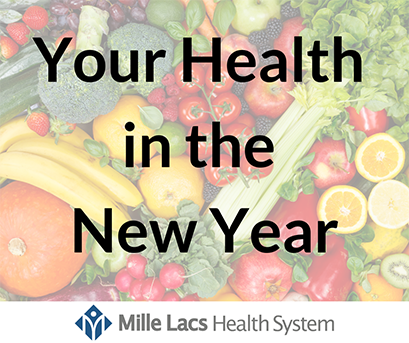Healthy 2024
January 15, 2024
Many people have made or are still contemplating a New Year’s resolution. The concept works for some, but for others, there’s a hesitation to even make a resolution for fear of failure. If you’re in the camp of “resistant to even make a new year’s goal”, it’s time to put a new frame of thinking behind it. The new calendar year symbolizes a fresh start and everyone has goals for themselves so why not start now with making YOU a priority?
Prioritizing yourself can mean a lot of things to a lot of people, but one of the “easiest” ways to help yourself overall physically, mentally, and even emotionally is to eat better. It can be as simple as choosing more fruits and vegetables and less processed and sugary foods. The CDC reports that fewer than one in ten children and adults in the U.S. eat the recommended daily amount of vegetables. You do not need to start with a strict diet, or starve yourself, just make better food choices.
Of course, what goes hand-in-hand with healthier eating is also weight loss. According to the CDC, one in five children, and more than one in three adults in the U.S. struggle with obesity. In the last twenty years, the U.S. has seen an increase in severe obesity nearly doubling from 4.7% of the population to 9.2%.
Obesity is putting a strain on American families, affecting overall health, healthcare costs, productivity, and military readiness. On the military front, it is reported that only two in five young adults are weight-eligible and physically prepared for basic training. Currently, 19% of our active duty service members are classified as obese.
Obesity can increase the risk of many health conditions such as: high blood pressure and high cholesterol which are risk factors for heart disease. Breathing issues such as asthma and sleep apnea are common health concerns as are type 2 diabetes, joint problems, gallstones and gallbladder disease, and some types of cancer. Besides physical challenges, obesity also can contribute to anxiety, depression, and low self-esteem.
Start today by passing on the junk food and reaching for the veggies instead. The best way to have success with healthy eating and weight loss is to start with small achievable goals and update them as they are reached. Too many people fail at their New Year’s resolutions for themselves because they try to flip a switch and change everything all at once. Be kind and patient with yourself, change takes time.
Aim for a healthful assortment of foods that includes vegetables, fruits, grains (especially whole grains), skim milk, fish, lean meat, poultry, and beans. Choose foods that are low in fat and low in added sugars.
Consult with your medical provider before making any drastic changes to your diet, and always prioritize any specific dietary orders related to underlying health conditions.
Lastly, to maximize the potential in your weight loss journey and overall health improvement don’t forget to add more physical activity into the mix. Thirty minutes of moderate daily physical activity is a great place to start.
